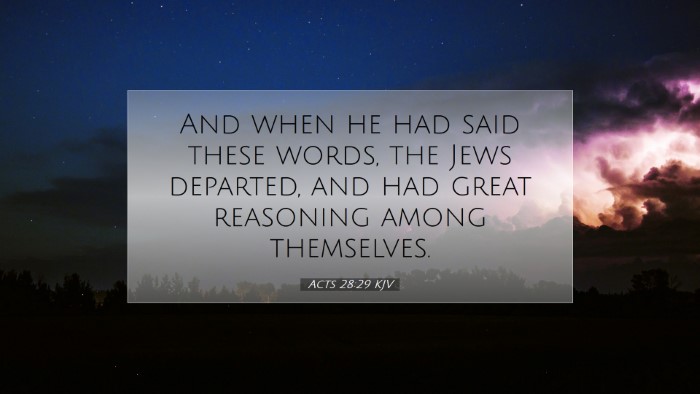Commentary on Acts 28:29
Verse Context: Acts 28:29 states: "And when he had said these words, the Jews departed, and had great reasoning among themselves." This verse concludes the Apostle Paul's address to the Jewish leaders in Rome, encapsulating the tension and division of thought regarding his message and ministry.
Introduction to Acts 28
Historical Background: The Book of Acts, authored by Luke, details the early church's formation and the spread of the Gospel. Chapter 28 concludes this narrative by focusing on Paul’s ministry in Rome, where he is under house arrest yet continues to preach and teach.
Verse Analysis
Paul’s Final Declaration: Paul’s closing statements to the Jewish leaders highlight the prophetic words of Isaiah, emphasizing their spiritual blindness and rejection of the message of salvation. The reference to Isaiah demonstrates Paul’s grounding in the scriptures, affirming his role as God’s messenger.
Key Themes in Acts 28:29
- Rejection and Division: The Jews' departure signifies a critical moment of rejection, indicating deep-seated divisions. This mirrors the larger theme throughout Acts regarding the reception of the Gospel among the Jewish people.
- The Schism of Belief: The great reasoning among themselves can be viewed as a microcosm of the early church's struggles—a mixture of doubt, inquiry, and the quest for truth within the community of faith.
Commentary Insights
Matthew Henry: Henry notes that Paul’s audience does not fully accept the message, leading to debate among themselves. He stresses that God’s message will confront the heart and mind, prompting reflection and division when met with stubbornness.
Albert Barnes: Barnes elaborates on the implications of Paul’s use of the prophecy from Isaiah. He highlights that the rejection is not merely individual; it is a corporate refusal by the nation of Israel to accept God's chosen messenger. Barnes concludes that this signifies a pivotal transition for the Gospel, as it moves beyond Israel's immediate grasp to the Gentiles.
Adam Clarke: Clarke provides insight into the philosophical and theological debates that ensued among the Jews. He notes that their reasoning ultimately reflected diverse beliefs about the Messiah and the nature of salvation. Clarke emphasizes the impact of cultural and religious biases, demonstrating how these barriers can hinder comprehension and acceptance of divine truth.
Theological Implications
The discourse seen in Acts 28:29 raises essential points for theological reflection:
- The Nature of Rejection: It serves as a sobering reminder of how close proximity to truth can exist alongside spiritual blindness. The Jews had the scriptures and the prophets, yet they did not see the fulfillment of those prophecies in Jesus Christ.
- God’s Sovereign Will: Despite the rejection, God’s plan of salvation continues forward. Paul is not dissuaded but rather demonstrates perseverance, a pivotal lesson for Christian ministers today.
Application for Ministry
Encouragement for Pastors: The verse encourages those in ministry to understand that rejection is often part of sharing the Gospel. Like Paul, they are called to remain faithful, to preach the truth, and to engage with differing views thoughtfully.
Guidance for Theologians: The theological implications drawn from this verse provoke exploration into the nature of belief and its societal ramifications. It invites scholars to scrutinize how cultural backgrounds shape one’s openness to the Gospel and the relevancy of the Christian message in diverse settings.
Reflection for Students: For students of scripture, Acts 28:29 illustrates the importance of dialogue in faith. Engaging with opposing views, as evidenced by the Jewish leaders' contemplation, can lead to deeper understanding and faith maturity.
Conclusion
Acts 28:29 encapsulates a crucial moment in the book of Acts, as well as the broader narrative of God’s redemptive work through Jesus Christ. Paul’s experience reflects a timeless truth: the Gospel can provoke great thought and division, but it bears the power to transform lives. Scholars and believers alike are encouraged by this passage to continue engaging with scripture, seeking truth amidst controversy and demonstrating grace in disagreement.


